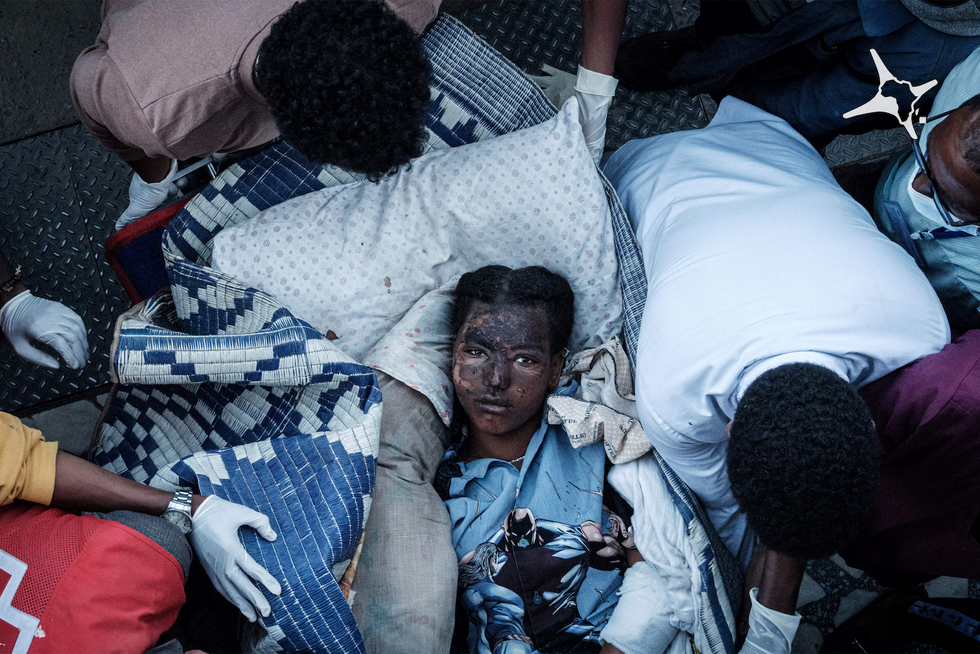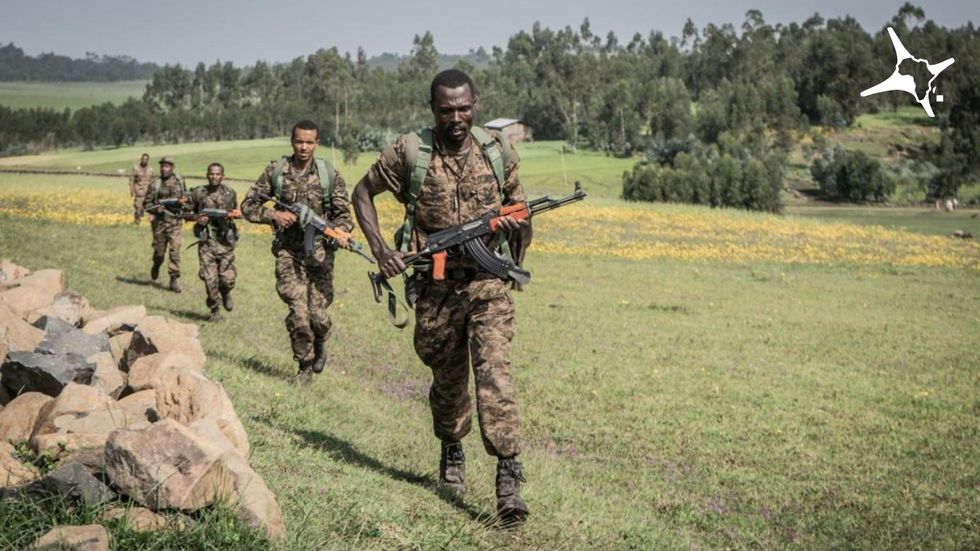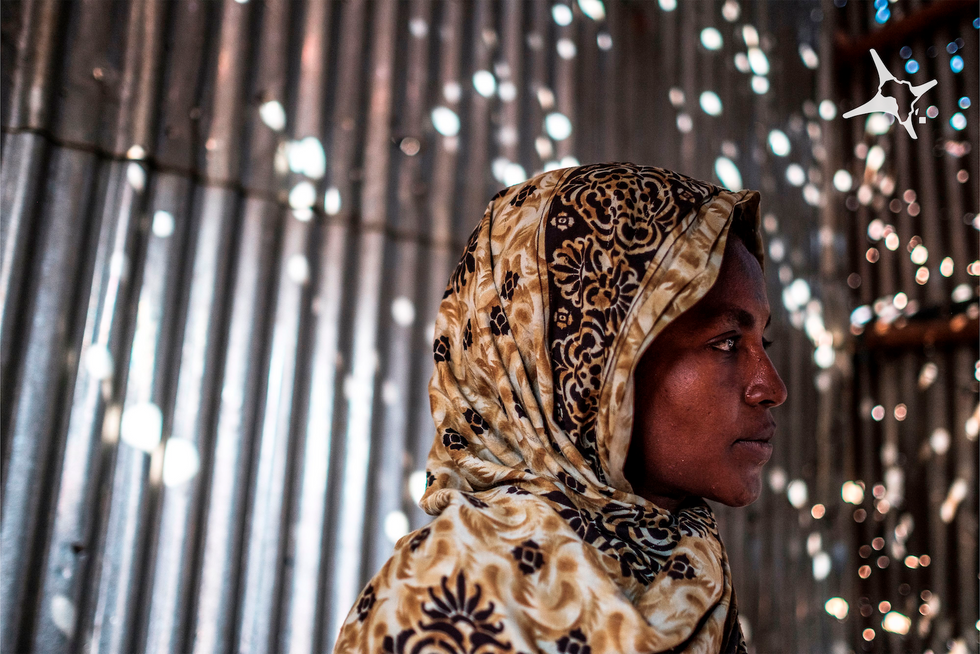Massacres in the Dark
Investigative journalist Lucy Kassa recounts the emotional challenges of covering the conflict in Northern Ethiopia for 11 months.

Ethiopian refugees who fled Ethiopia's Tigray conflict arrive by bus from Village Eight transit centre near the Ethiopian border at the entrance of Um Raquba refugee camp in Sudan's eastern Gedaref state
Photo Credit: YASUYOSHI CHIBA/AFP via Getty Images
The following piece is explicit in the descriptions of the war in the Northern regions of Ethiopia. Reader discretion is advised.
"Five Ethiopian soldiers came to our house to rape me," a young woman from Wukro tells me. Wukro is a town. Sits along the Genfel river. Tigray region. Northern Ethiopia. This is war. Government forces and The Tigray People's Liberation Front kill at will.
"My brother tried to defend me from them," she continues. "The soldiers shot him in the head and took turns raping me. They raped me beside his [body]."
I am a reporter. I cover this conflict. I investigate war crimes. It is edging toward its eleventh month. The conflict keeps growing: TPLF forces are now in the Amhara region, Afar and the ancient city of Lalibela. Prime Minister Abiy called for the entire country to take up arms against them.
I am tired of the war. I am tired of the lies and propaganda. The suffering of innocents. The madness. Every day I steel myself for what horror or tragedy will befall my people in the next stretch of hours. I am used to horrors I should not be used to. Burned bodies, mutilated bodies, shockingly emaciated children, horrifying testimonies, haunting images, unimaginable evil.

Many thousands of civilians are dead. Almost two million people are forced to flee their homes. UN officials throw out big numbers. More than 400,000 people in Tigray face famine. 1.8 million are on the brink of famine. Reports indicate the Ethiopian government and its allied forces from Eritrea and Amhara region systematically raped Tigray women. Amnesty counts1288 cases. Only a few women report their cases. Most keep silent. The government denies it. Or suggest it is rogue troops that will be brought to justice. After the investigations.
All communications to the region are blocked. Aid corridors are blocked. Mass killing. Man-made famine. Weaponized sexual violence. The farmers I spoke to were forced to leave their farms sallow. "Eritrean soldiers burned all of my crops and food reserves" a displaced Tigrayan woman tells me, "They took my sheep." Bodies were found in a river. Some bearing the marks of torture. The dead are left to be eaten by wild animals. Parents were not allowed to bury their loved ones.
My reports are evidence-based. I speak with witnesses. I cross-check and verify everything they say. First, I spoke with survivors. That is too dangerous now. I speak to them on smuggled phones. They tell me horror stories. They send me pictures. I look at satellite imagery. I watch videos. One shows a gang-raped woman getting rocks and plastics removed from her vagina. More horrors. I am a woman. But I am also a reporter. I need evidence before I believe.
One morning, security agents in civil clothes raid my apartment in Addis Ababa. Their eyes are hard. They warn me about my investigation. They warn me to stop. They threaten to kill me if I don't. They ransack my place. I must move. Leave everything behind. Unprepared. I am in danger. I am terrified. But it is selfish not to tell the story. My conscience would haunt me. I don't care. What happened to me is insignificant.
I investigate the atrocities no matter who commits them. "We heard the Tigray forces marching close to our village," a woman tells me. Tigray forces capture Chena, a rural village in the Amhara region. "Many villagers fled. But before I managed to flee, they arrived." They told the villagers to relax and that they would not target innocent farmers. But that was a deception. "They came to my house and shot me. Two days later, they came again and pulled my husband from the house and killed him. Then they killed my 8-year-old son and twenty of my neighbours."

I move to a new place. But I must move again. I am scared. I am traumatised by the threats. Nightmares. There is a smear campaign of violence, harassment and appalling defamation against me. I see people who don't even know me saying things. I don't care. They want to massacre people in the dark. I won't let them.
The government denies all reports of war crimes. They call it misinformation. But there is too much evidence. There is documented proof. The TPLF rejects allegations of atrocities in the Amhara region.
There are no good actors in this conflict. They have all gone mad. The blackout gives them cover to commit these atrocities in the dark. I won't let them.
The government forces bombed churches, mosques. Al-Nejashi, the first mosque in Africa, is partially destroyed and looted. Ancient monasteries in Tigray are bombed. They murdered priests. They massacred 400 civilians in Axum. Axum. It is our holy city, where Ethiopia's 3000 year history began. This happened in many other places of Tigray. I know what I have reported is just the tip of the iceberg.
"The town was filled with corpses," a survivor in Tigray tells me. "We could smell the bodies of our friends and neighbours. We kept our grief to ourselves."

The war online makes matters worse. More denial. Lies. Madness. Crazy war propaganda. Misinformation.
I am a reporter. I need evidence. I don't address unverified claims. I don't even want to talk about unsupported allegations. I am neither interested in talking about an accusation I have not verified personally.
The calls for justice are selective. Mutilation. Rape. Murder. All become fodder for the next round of internet propaganda. The dead become commodities. Empathy and understanding do not extend beyond ethnicity. Hatred and trauma from the war has blinded us all.
I am tired of reporting this war. But I must continue. The perpetrators of these horrors must be held accountable. It is still going on. Many more will suffer. Many more children will die from famine. Many more mothers will be displaced.
Still, we must find a way to stop. We must come to grips with how we are all accountable. It is difficult. But it is not impossible.
I am in a new place. Far from my home. I don't know when I will be able to go back. When it is quiet, I think about the Rwandans. They found a way. They experienced the trauma of gruesome ethnic violence. But they moved on from the past. They managed to come to their senses. I must believe this healing is possible.
This article appears as a part of OkayAfrica's Crossroads, a special series examining Global Africa at critical moments. For our first package, we will dedicate 4 weeks of coverage to examining the lands of Ethiopia through a deep dive into music, politics, and culture. Keep up with the campaign here - crossroads Stories
- Heavy Is the Head: The Trials of Abiy Ahmed - OkayAfrica ›
- 10 Songs That Tell the Story of Ethiopian Music - OkayAfrica ›
- The Weeknd Discusses His Ethiopian Heritage - OkayAfrica ›
- Ethiopia's First Female Superhero Comic 'Hawi' is Here - OkayAfrica ›
- Women Tell the Story of Ethiopia's Red Terror In This New ... ›
- Kendrick Helped Popularize It, But We Need To Talk About The ... ›
- Ethiopia's First Female Superhero Comic 'Hawi' Nominated for 'Best ... ›
- GAME OF THORNS - OkayAfrica ›
- Sudanese Forces Agree to Protect Civilians, While Rejecting Cease-Fire Efforts - OkayAfrica ›



